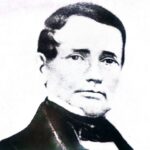GRANT, FRANCIS CHAPMAN
- 4 Min Read
Francis Chapman Grant (1825-1908), a prominent figure in the Fante Confederation of 1868-73, and a member of the Gold Coast Legislative Council, was one of the most successful of “African merchant princes” of the 19th century.
He was the son of a Scottish father, Mr. C. Grant, and of an African mother from Cape Coast. He was born in 1825, and was educated in England, where he taught in various schools before returning to Cape Coast.
Since his father had business interests in West Africa and America since the 18th century, Francis Grant was familiar with business in West Africa, and now began to engage in it. He established his headquarters in Cape Coast with branches in Sekondi and Axim. He was active in Gold Coast politics and in social reform, and served on the Cape Coast Town Council in 1858. He also helped to establish some of the literary and social clubs that were common in Fanteland from the 1860s onwards.
He was, for example, one of the founders of the Gold Coast Union Association which was launched in Cape Coast in October 1881, with the aim of encouraging Africans to appreciate things African, and of persuading the British administration to introduce legal reforms. Although the association was supported in its objectives by some European merchants, its proposals were not adopted by the British.
When the Fante Confederation was formed in 1868, Grant, who had served on the Gold Coast Legislative Council from 1863-66, took a leading part. He was listed as the Confederation’s treasurer in 1871. After the arrest by the British of some members of the Confederation’s executive, the British acting administrator, C. S. Salmon, who was offended that Grant had deceived him concerning his participation, asked him to dissociate himself from the Confederation.
Grant did so by claiming that he did not know that his name had been included among the Confederation’s office holders, adding in a letter to Salmon, dated December 1, 1871, that he would not encourage any acts having a tendency to lessen British rule and influence in the country.” Yet earlier, on November 21, 1871, he had written to the Confederation’s secretary J. B. Amissah that he could see no reason why he should refuse to act as treasurer. He added, “The Government will make a colony of the Coast if we do not stir ourselves to self-government!”
Grant was subsequently highly commended by Sir Arthur Kennedy, governor-in-chief at Sierra Leone of the British West African settlements, for his integrity. Kennedy also clarified the situation by stating in 1872 that Grant had been “a strong supporter of the Confederation.” After the troubles associated with the Confederation had blown over, Grant was appointed to the Gold Coast Legislative Council in 1871, again in 1873, and once more, as an extraordinary member, in 1887.
As a merchant, he maintained good trade relations with the states of the interior. He was employed as a mediator in disputes between the British administrator and the coastal states on the one hand, and the Asante on the other. He was a mediator between Asante and the British, for example, for the return of Friederich Ramseyer and J. Kuhne, the German missionaries captured by the Asante in 1869.
The Asante authorities would not release the two men until they had received a ransom of £6,000. Though the British refused to accede to the demand, it was later agreed that the money should be paid to Grant to be held in trust for the Asantehene until the prisoners were freed.
Grant was the proprietor of the Gold Coast Times, published under the editorship of James Hutton Brew in 1874-75. In 1882 he became chairman of the Gold Coast Native Concessions Purchasing Company, whose aim was to buy leases of mining concessions from chiefs in the Tarkwa district, in what is now southwestern Ghana, and sell them at huge profits to the European mining companies. The company failed, however, and was dissolved after a year.
L. H. OFOSU-APPIAH




